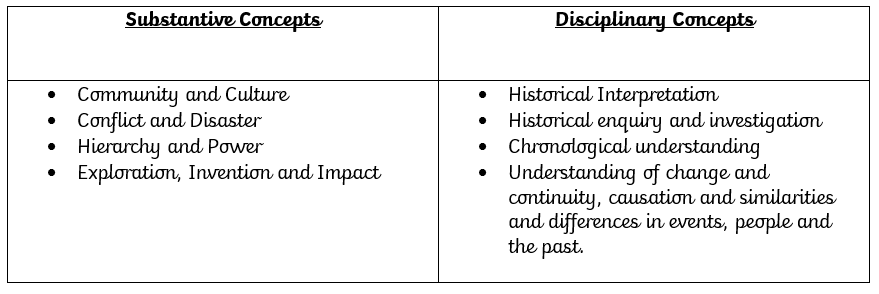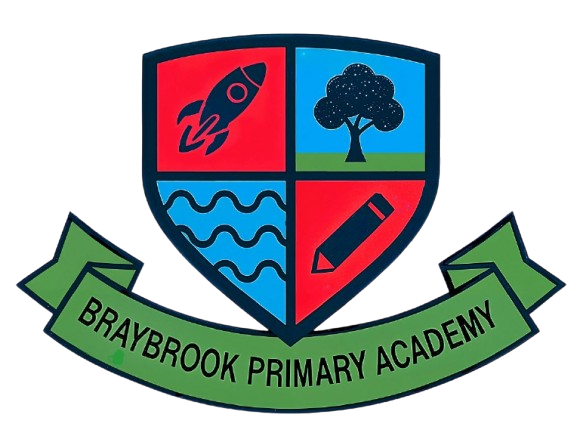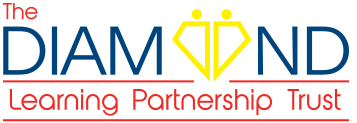History
Intent:
Knowledge and skills:
Through our knowledge-engaged curriculum, our pupils will acquire both knowledge and skills through our carefully thought out curriculum, which is line with the National Curriculum. We have identified key substantive concepts and disciplinary concepts, also known as golden threads to help us achieve this. These are:

Our pupils will acquire their knowledge and skills through these key concepts (golden threads). These concepts will progressively develop through each year group and build on knowledge and skills to promote our knowledge-engaged curriculum. These are the key concepts, that as historians, we want our pupils will keep coming back to ensure they have flexible mental models of knowledge to take with them in their next stage of the learning journey and beyond.
Objectives and End Points:
Our pupils deserve to be enriched with knowledge and develop flexible, transferable skills that they can apply across the curriculum and in future learning and beyond. As a school, we have a clear structure and progression to ensure that our pupils are successful in meeting their end points in each key concept; ensuring they have the skills and knowledge ready for their next steps.
As Historians, our pupils will:
- Have secure knowledge and understanding of chronology of historic eras and events and articulate these in a meaningful and confident way.
- Have a depth of historical vocabulary and apply this when articulating their knowledge of historical concepts.
- Know a range of significant individuals from the eras studied and articulate how they have changed the present and continue to impact on the future.
- Know what communities and cultures were like for a range of era/period of history and articulate with confidence the impact they have had on life today.
- Explain the significance of past events, how they were caused, the consequences, the conflicts and disasters that followed and how it impacted the past, present day and how this will inform decisions in the future as citizens of society.
- Understand the theme of hierarchy and power and how history could have been different through individual leaders and decisions that were made. Children will understand the lives of many significant individuals of the past and how their legacy is still impacting society today.
- Understand the importance of enquiry and apply this with the ability to think critically, assess, analyse and argue their understanding and knowledge. They are also equipped with the skills to organise their knowledge through oracy, recordings, data, artefacts, pictures etc.
- Describe and compare different periods of history in terms of their similarities and differences; making connections and draw contrasts and identify trends to improve historical perspective.
- Foster a love for history through memorable experiences both in the classroom and beyond.
Why:
At Braybrook, we carefully planned out our knowledge-engaged curriculum to ensure that our pupils have a wide and balanced curriculum; ensuring the National Curriculum objectives were met with confidence. We chose the areas of learning that best helped us to achieve this, whilst also providing the most engaging areas of learning for our pupils that would have meaning for them. We have designed our curriculum to develop a secure sense of chronology, whilst also focusing on how history has shaped life in the present day.
Our History Curriculum is taught explicitly to each year group, linking between the two through golden threads ensuring all elements of the curriculum are covered. However, at the heart of each year group every half term, are units that with encompasses our pupils with the historical knowledge and skills that result in becoming successful historians and build a coherent, chronological timeline of history We have also enhanced our learning provision by offering our pupils a local history focus, as well as key themes, such as: ‘Black History Month’. We also carefully considered three key areas of knowledge; living, beyond living, British and wider world. This has been integrated and golden threads linked to ensure it is part of our whole school curriculum and children developed a foundation of secure understanding of the knowledge and skills needed to build on successful learning.
Locality Focus within our curriculum:
- Year 1: How the seaside has changed over time - Hunstanton
- Year 2: Childhood – How Braybrook School has changed over time.
- Year 3: Prehistory – links to Flag Fen.
- Year 4: The Tudors – Catherine of Aragon Study.
The Railway Evolution – Nene Valley Railway. - Year 5: WW1 and WW2 – local residents experiences of World War 2 (stories from ancestors) and the impact of the Blitz on Peterborough, inc evacuation.
- Year 6: Medicine and Disease – impact on Peterborough.
Implementation:
Teaching and Learning:
At Braybrook, History teaching focuses on enabling children to think as ‘historians’. We place an emphasis on historical skills to help aid and support rich knowledge. In unison of this, we will also provide opportunities (where possible) to follow lines of enquiry; encouraging children to be inquisitive and ask questions to deepen their knowledge further. We encourage pupils to explore their curiosities and become critical thinkers within our knowledge and concepts taught. Skills of a ‘Historian’ are shared with our pupils and prompted through our learning posters; which are referred to within our lessons and found at the front of their history book.
In each key stage, we provide children with the opportunity to go beyond The National Curriculum, providing opportunities to make history meaningful through memorable experiences. We encourage visitors to come into the school and talk about their experiences. We recognize and value the importance of stories in history teaching and we regard this as an important way of stimulating interest of events, people and the past. We encourage our pupils to build their vocabulary and apply it through oracy skills to articulate their knowledge.
We recognise the fact that in all classes there are children of widely-different abilities in history and we seek to provide suitable learning opportunities for all children by matching the challenge of the task to the ability of the child, whilst still ensuring they can work towards our end points successfully. We achieve this by:
- Constructing curriculum plans into small steps and ensure the working memory is not overloaded.
- Recall and repeated retrieval practice at the start of every lesson means pupils save their knowledge into their long-term memory and encourages pupils to know more, remember more and can do more.
- Setting tasks are open-ended and can have a variety of responses, whilst ensuring pupils think like historians.
- Setting tasks of increasing challenge, which is scaffolded where needed.
- Providing children with the opportunities to not only work with their ability group, but having the experiences of working in mixed ability pairings to ensure all pupils have the chance to strive for success.
- Providing resources of different complexity depending on the ability of the child.
- Ensure all pupils have first class quality teaching provided.
In the foundation stage, teaching is based on the Early Years Foundation Stage Framework and is implemented as part of Understanding the World: Past and Present, through themes. They also play an integral part of the progression to our end points and use continuous provision to meet their objectives and have been carefully planned for to ensure they are part of our history vision.
Teaching history to children with special educational needs
At Braybrook, we teach history to all children, whatever their ability and strive to deliver the same ambitious curriculum. History forms part of the school curriculum policy to provide a broad and balanced education to all children. Through our history teaching, we provide learning opportunities that enable all pupils to make progress. We do this by setting suitable learning challenges and responding to each child’s different needs. Assessments against our knowledge and skills progressions helps us to assess outcomes.
When progress falls significantly outside the expected range, the child may have special educational needs. Our assessment process looks at a range of factors – classroom organisation, teaching materials, teaching style, and differentiation – so that we can take some additional or different action to enable the child to learn more effectively. This ensures that our teaching is matched to the child’s needs. We enable pupils to have access to the full range of activities involved in learning history. Children are encouraged to participate in activities outside the classroom, for example, experiencing similar skills of an archaeologists at excavation sights, such as Flag Fen. We provide pupils support to be successful historians by ensuring their needs are met and they are supported by teachers, teaching assistants, specialists, where needed, and the SENDCo.
Resources:
Resources to support units across the school are kept within the classroom or in a central unit. They have been broken down into relevant golden threads and key stages. There is a resource list available to all staff and a selection of recommended websites. We are also proud to have invested in a large volume of hands-on artefacts to ensure the children within our context have hands on experiences, something that many arrive at Braybrook not having experienced.
Impact:
Progress:
To ensure our pupil make progress, learn more and remember more, we ensure that we provide children with the opportunity to retrieve key information and make links that build on prior learning. At Braybrook, we want to ensure that knowledge and skills are transferred from the short-term memory to the long -term, by providing opportunities to remember and make learning ‘stick’. We also ensure that the national curriculum objectives have the opportunity to be repeated on multiple occasions in each year group and repeated through later year groups to ensure pupils develop secure and flexible mental models and transfers learning from the short-term to the long-term memory.
Standards:
The history subject leader monitors samples of children’s work and evaluates these to ensure standards are being met and provide support where needed. These demonstrate what the expected level of achievement is in geography for each age group in the school and are also used as evidence of coverage for each year group; ensuring that the national curriculum objectives are met in a broad and balanced way. In addition to this, pupil conferencing is undertaken by the subject lead and professional dialogue exchanged with staff to support the evidence provided. Book looks and coverage monitoring is undertaken by the geography subject lead on a termly basis, with feedback provided and actions carefully monitored. Teachers have an opportunity to respond and engage with these. Teachers will make a judgement on the end points, key concepts and knowledge to determine if they have yet to obtain, met or exceeded the unit objectives and report this to parents at the end of each academic year, through school reports. This will be shared with the subject lead and the cohorts next teacher. The subject lead will track each class, in line with the end points, to ensure that most children are on track to leaving Braybrook as successful, confident historians.

